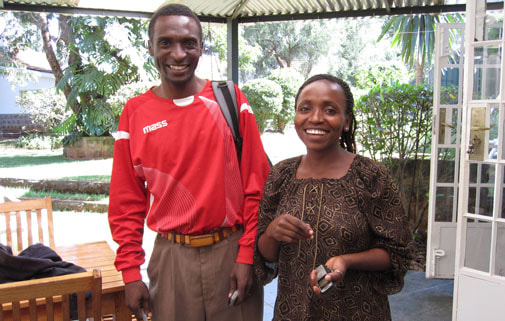Teaching in Silence

In one of the hardest hit areas of Aids in Africa, the international community and local government have worked diligently to bring assistance for those stricken by this pandemic disease. These helps include: testing centers, counseling, educational materials & classes, behavioral change models, subsidized Anti-Retroviral (ARV) medications, nutritional helps, networking helps, support groups, etc. This assistance has been substantial and effective in these areas to help people living with Aids. However, this assistance has not reached one population of people, the deaf.
The deaf cannot be tested by a hearing person because by mandate they must be tested by a certified HIV Tester/Counselor who can also give them counsel regarding Aids, recommended health practices, helps on how to live with Aids if tested positive, etc. Unless a hearing counselor knows Sign Language, they cannot counsel a deaf person in such a way.
Even a hearing person in this area has difficulty living with Aids. In the past, many who have tested positive for Aids have committed suicide leaving their spouse and large families behind. Part of this problem is simply due to the myths and misinformation that has plagued this region for years. Aids still has such a negative stigma. It is often thought to be a curse to a person and to be contagious; therefore, most positive people do not come out in the open and tell anyone if they have tested positive. They fear losing their jobs, losing their families, and/or being ostracized from their communities as if they had leprosy.
For a deaf person who is often already considered a cursed person, the problems for the positive deaf are multiplied. Even if they were born with Aids (the highest transmission of Aids is mother to child), or perhaps they find out they have Aids accidentally while receiving medical treatment, who can they tell that they are positive? Where can they go to get help? This is the despairing situation for many deaf who test positive in Africa.
We recently met a woman named Beatrice. Beatrice is a health professional who is totally deaf. She was born hearing and we are told that at the age of seven she became ill with a bad case of the mumps and she lost her hearing completely. A few years ago, Beatrice was sponsored to become a certified HIV Tester/Counselor, and became one of two deaf persons in this region who could test and counsel the deaf. She was then offered a six month internship at a local hospital, but the grant money ran out and she was left with nowhere to work and no place to help the deaf. Frustrated with the system, she still tried on her own to offer whatever assistance she could to the deaf in her area, but she had to find another job to continue making a living.
Beatrice heard about SMI and how we form partnership projects with nationals at the local level. She came to us explaining her situation and presented a proposal which included a holistic approach to help the deaf in her area and work alongside hearing organizations as much as possible in their Aids assistance efforts.
Within a short time SMI set up an exciting partnership project that not only enabled Beatrice to get back to the work helping the deaf in her community, but it allowed her to travel to other communities offering testing, counseling, health education and materials, follow-up, networking, etc. In the first six months of this project, Beatrice tested and counseled over two hundred deaf, taught classes in fourteen communities and began four support groups for positive deaf.
It is our hope to continue developing this program so that in the future this type of assistance can be modeled after by other regions to help many more thousands of deaf who desperately need this support.
The deaf cannot be tested by a hearing person because by mandate they must be tested by a certified HIV Tester/Counselor who can also give them counsel regarding Aids, recommended health practices, helps on how to live with Aids if tested positive, etc. Unless a hearing counselor knows Sign Language, they cannot counsel a deaf person in such a way.
Even a hearing person in this area has difficulty living with Aids. In the past, many who have tested positive for Aids have committed suicide leaving their spouse and large families behind. Part of this problem is simply due to the myths and misinformation that has plagued this region for years. Aids still has such a negative stigma. It is often thought to be a curse to a person and to be contagious; therefore, most positive people do not come out in the open and tell anyone if they have tested positive. They fear losing their jobs, losing their families, and/or being ostracized from their communities as if they had leprosy.
For a deaf person who is often already considered a cursed person, the problems for the positive deaf are multiplied. Even if they were born with Aids (the highest transmission of Aids is mother to child), or perhaps they find out they have Aids accidentally while receiving medical treatment, who can they tell that they are positive? Where can they go to get help? This is the despairing situation for many deaf who test positive in Africa.
We recently met a woman named Beatrice. Beatrice is a health professional who is totally deaf. She was born hearing and we are told that at the age of seven she became ill with a bad case of the mumps and she lost her hearing completely. A few years ago, Beatrice was sponsored to become a certified HIV Tester/Counselor, and became one of two deaf persons in this region who could test and counsel the deaf. She was then offered a six month internship at a local hospital, but the grant money ran out and she was left with nowhere to work and no place to help the deaf. Frustrated with the system, she still tried on her own to offer whatever assistance she could to the deaf in her area, but she had to find another job to continue making a living.
Beatrice heard about SMI and how we form partnership projects with nationals at the local level. She came to us explaining her situation and presented a proposal which included a holistic approach to help the deaf in her area and work alongside hearing organizations as much as possible in their Aids assistance efforts.
Within a short time SMI set up an exciting partnership project that not only enabled Beatrice to get back to the work helping the deaf in her community, but it allowed her to travel to other communities offering testing, counseling, health education and materials, follow-up, networking, etc. In the first six months of this project, Beatrice tested and counseled over two hundred deaf, taught classes in fourteen communities and began four support groups for positive deaf.
It is our hope to continue developing this program so that in the future this type of assistance can be modeled after by other regions to help many more thousands of deaf who desperately need this support.
